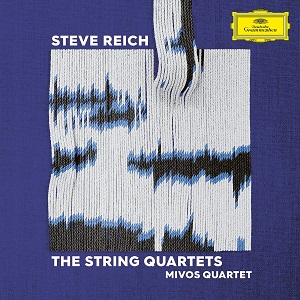
Steve Reich (b. 1936)
The String Quartets
WTC 9/11 for string quartet and pre-recorded tape (2010)
Triple Quartet for string quartet and pre-recorded tape (1998)
Different Trains for string quartet and pre-recorded performance tape (1988)
Mivos Quartet
rec. 2020/22, EMPAC Concert Hall, Troy, New York
Deutsche Grammophon 4863385 [58]
I have tended to think that Steve Reich peaked early. He began in the 1960s with a group of works which exploited phase shifting, such as It’s gonna rain and Violin Phase; some people regard these as minimalist classics, but I find them to be more sketches and experiments than satisfying artistic works. He then reached early maturity in the 1970s with a group of works which include Drumming, Music for Eighteen Musicians and The Desert Music. These have incorporated the minimalist techniques into really satisfying works, which also have a radiance about them. Not surprisingly, they have had numerous recordings. Those of his later works which I have heard have not seemed to me to add anything while losing that radiance., However, I am always willing to be persuaded that I have been wrong, so I was glad to receive this disc of all three of Reich’s string quartets to review, as quartets often bring out the best in a composer.
They are presented here in reverse chronological order. WTC 9/11 commemorates the attacks on the World Trade Center in New York on 11 September 2001 – 9/11 in American style. This uses speech samples taken from those involved at the time overlaid over the quartet’s playing. Obviously, for those who were in any way caught up with that terrorist attack, or who were around and remember it, this will have a particular resonance. However, listened to simply as a musical work, I find it less than satisfactory: putting spoken – as opposed to sung – words over music has been tried many a time over the years. It used to be called melodrama, and it is rarely successful. So it is here: the snatches of speech take the foreground and the chugging rhythms of the quartet become just incidental music. It is best regarded as an occasional work.
Triple Quartet is another matter. What the sleeve note does not explain is that the work actually requires either three quartets, making an ensemble of twelve, or, as happens here, one quartet prerecords the parts for quartets two and three and plays these back while they play the part for quartet one live. It was suggested by Bartók’s fourth string quartet, specifically by the ending of that work, and Bartók seems to have had a wholly beneficial influence on Reich here. The work has a nervous intensity and an eloquence which is most affecting and the middle movement even leans towards expressionism. I am very happy to add this work to the relatively short list of Reich works that I cherish.
Different Trains is the earliest of these works and has been hailed as a modern classic. The title refers to the fact that during the Second World War, Reich, whose parents had separated, moved between them by train from New York to Los Angeles and back, accompanied by his governess, while if he had been in Europe, as he was Jewish, he would have been on a train to Auschwitz. This was the first of Reich’s works to overlay speech onto music, in this case including reminiscences of his governess Virginia, holocaust survivors and others and also train noises of the time. Although this is quite evocative, I find that the purely musical content is not satisfying, and the recorded speech contributes little. I wonder whether people have liked the idea of the work more than the work itself. Reich, however, was very pleased with the effect and believed that this kind of combination of speech and music had a great future.
All these works were written for the Kronos quartet and have been recorded by them, though on different discs. These are still available as downloads, though the physical discs can be obtained fairly easily second-hand. However, Reich encouraged the Mivos Quartet to record all three on one disc and this is certainly more convenient for those coming to these works new. The composer was present at the recording sessions and he obviously approves of the performances, which are very assured. The recording is good, but the sleeve note only moderately helpful: it does not, for example, include the words of the two works which use them and it tells us nothing about the performers. So there are two works which I see as documents of their time, but the Triple Quartet is really quite wonderful.
Stephen Barber
Help us financially by purchasing from




















